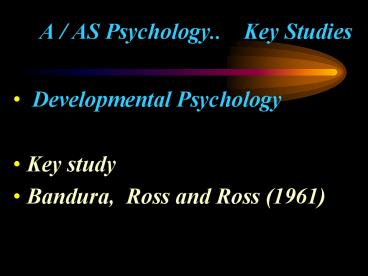A AS Psychology.. Key Studies PowerPoint PPT Presentation
1 / 28
Title: A AS Psychology.. Key Studies
1
A / AS Psychology.. Key Studies
- Developmental Psychology
- Key study
- Bandura, Ross and Ross (1961)
2
Bandura, Ross Ross
- Do children learn behaviour from T.V.?
- Could we devise an experiment to find out is this
is the case? - Consider how you would plan this experiment.
3
The Question?
Nature vs. Nurture
- Nature
- To what extent do we get our skills, attitudes,
and so on directly through our genes from our
parents? - Are we born aggressive?
- Nurture
- Do children learn behaviour from the behaviour
they see around them? - Do we learn aggression?
4
Specifically.
- Can aggressive behaviour be learned by
observation? - NB This was the study that triggered the TV
violence debate
5
Before we begin.Albert BANDURA
- List two behaviours you think might be learned by
watching others. - List two behaviours you think could not be
learned in this way.
6
Bandura Ross Ross The BOBO doll study
- Aim If children were witnesses to an aggressive
display by an adult they would imitate this
aggression when given the opportunity. - TWO adult role models -
- one male and one female and a female experimenter
7
Bandura Ross Ross The BOBO doll study
- The participants
- 72 children (Stanford University nursery school)
- 36 boys 36 girls
- age range 37 months - 69 months
- Mean age 52 months
8
Bandura Ross Ross The BOBO doll study
- Method a laboratory experiment in controlled
conditions. - There were three conditions
- 24 children in each condition
9
Bandura Ross Ross The BOBO doll study
- The THREE CONDITIONS
- Non aggressive condition
- Aggressive condition
- Control condition
10
Bandura Ross Ross The BOBO doll study
- Non aggressive condition
- and
- Aggressive condition
- There were male and female role models
- 12 children in each
11
Bandura Ross Ross
12
Bandura Ross Ross
13
Bandura Ross Ross The BOBO doll study
- Thus
- 6 boys saw aggressive male
- 6 boys saw non-aggressive male
- 6 boys saw aggressive female
- 6 boys saw non-aggressive female
14
Bandura Ross Ross The BOBO doll study
- Thus
- 6 girls saw aggressive female
- 6 girls saw non-aggressive female
- 6 girls saw aggressive male
- 6 girls saw non-aggressive male
15
Bandura Ross Ross The BOBO doll study
- Level 1 Independent Variable (IV)
- Aggressive or non-aggressive role model
- Level 2 Independent variable (IV)
- Same sex or opposite sex role model
- Dependent variable
- Observed Behaviour of children
16
Bandura Ross Ross The BOBO doll study
- In order to ensure that each group contained
equally aggressive children they were all rated
for aggression before the experiment - rated on
- physical aggression, verbal aggression
- aggression to inanimate objects
- aggression inhibition (self control)
17
Bandura Ross Ross The BOBO doll study
- What happened then?
- Children taken one at a time
- Phase one of the experiment
- Modelling the behaviour phase
18
Bandura Ross Ross The BOBO doll study
- What happened then?
- Phase two of the experiment
- The AROUSAL phase
- This was necessary to provoke the children
19
Bandura Ross Ross The BOBO doll study
- What happened then?
- Phase three of the experiment
- The OBSERVATION phase
20
Bandura Ross Ross The BOBO doll study
- What was observed?
- The criteria
- Aggression - physical verbal
- Imitative aggression
- Non-imitative
21
The Results
22
Bandura Ross Ross The BOBO doll study
- The conclusion
- Learning can take place by observation without
classical or operant conditioning - Children more likely to learn from same sex
models
23
Bandura Ross Ross The BOBO doll study
- The conclusion
- Bandura suggested Freuds theory of
identification may be used to explain how
learning took place. - Which of Freuds stages might these children have
been in? - Phallic 5/6 years old
24
Bandura Ross Ross The BOBO doll study
- Thinking about British Psychology Society
guidelines - WAS THIS STUDY ETHICAL?
- What are the issues?
- If not ethical WHY not?
25
Bandura Ross Ross The BOBO doll study
- Thinking about methodology
- Does this study have ecological validity?
- If not ecologically valid - why not?
26
Bandura Ross Ross The BOBO doll study
- Thinking about the participants
- To whom can we generalise the findings?
27
Bandura Ross Ross The BOBO doll study
- The debate as regards children learning
aggressive behaviour from watching violence on TV - How might watching TV differ from the experience
of the children in the Bandura experiment?
28
Bandura Ross Ross The BOBO doll study
- THE END

